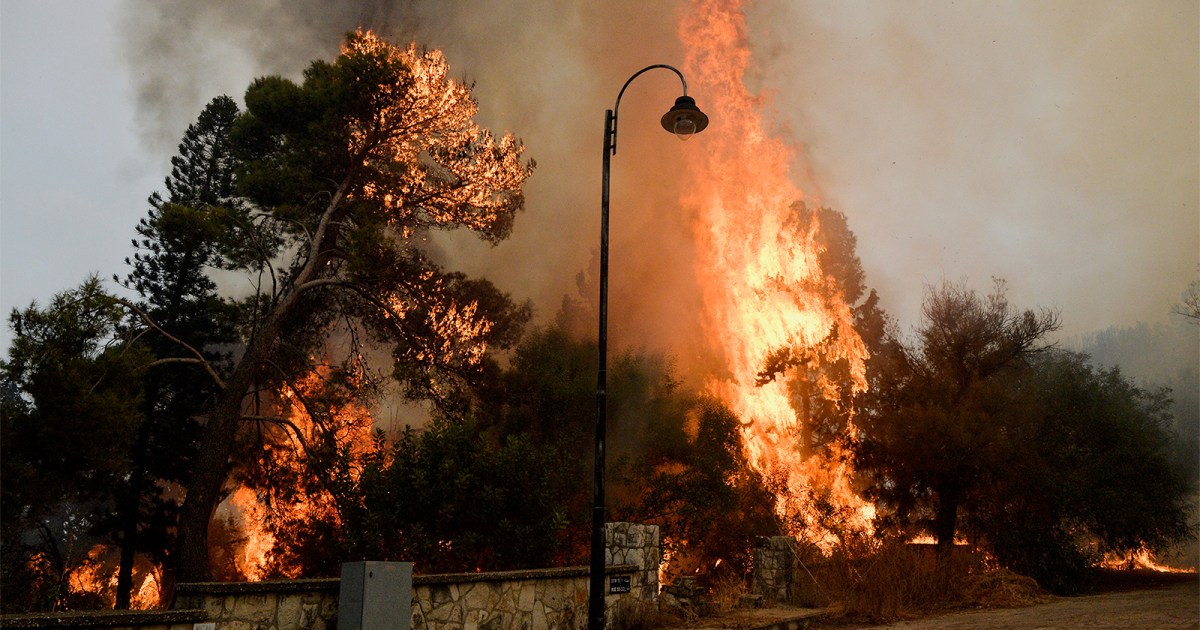Residents of several countries in the Middle East lived on high alert during the weekend due to various natural disasters that struck the region, some of which were due to climate change.
Emergency services were mobilized to deal with the harsh and unusual weather conditions that hit Lebanon, Iran, Egypt and Saudi Arabia, according to a report published by the British Middle East Eye website.
Video clips and photos spread on social networking sites revealing some of the disasters and damage they caused to people and property.
Forest fires in Lebanon
For days, Lebanon has witnessed a wave of fires devouring large areas of southern Lebanon, and the sound of helicopters flying over various towns in the south was heard on Sunday, after fires broke out in the area.
According to the Lebanese authorities, the fires killed at least one person, a foreign worker, who died after the flames reached a warehouse he was sheltering in in the city of Jdeideh (north of Beirut), according to a Middle East Eye report.
Lebanese Prime Minister Najib Mikati ordered the authorities and the army to take immediate measures to deal with the fires that are approaching the southern port city of Tire.
The fires, which were attributed to the high temperatures, spread to several mountainous areas and approached residential areas in some villages adjacent to the forests.
According to local media, the civil defense forces and volunteers have been trying to fight the fires and contain their spread since Saturday evening, but the wind speed contributed to the spread of the flames to new areas.
Two earthquakes in Iran
In Iran, on Sunday, people were forced to flee their homes after two strong earthquakes struck the south of the country.
According to Iranian state television, a 22-year-old man was killed after an electric pole fell on his head as a result of the earthquake.
The "Middle East Eye" report indicated that the strength of the two earthquakes that struck southern Iran near the port of Bandar Abbas on Sunday was 6.3 and 6.4 on the Richter scale.
The two earthquakes were felt in countries neighboring Iran, including the UAE and Saudi Arabia.
The Iranian Red Crescent sent teams to assess the damage in the area.
The website's report indicated that although Iran lies above many seismic fault lines, making it regularly suffer from moderate-intensity earthquakes, this week's earthquakes are uncharacteristically strong.
Scorpions invade an Egyptian city
The report of the British website indicated that the Egyptian citizens in the southern city of Aswan lived a difficult weekend searching for safety, after rain and flood waters washed away large numbers of scorpions to the streets and houses of the city.
At least 3 people died from poisonous scorpion stings, while at least 400 others were poisoned.
The report indicated that the scorpions that swept towards the streets and homes were looking for shelter in the harsh weather conditions.
The authorities in Aswan issued orders to close schools in the city, imposed restrictions on travel and traffic due to low levels of visibility due to difficult weather, and urged citizens to stay in their homes and avoid places with trees, as well as avoid driving their vehicles on highways.
The Egyptian Meteorological Authority said that it expects intermittent rain and thunderstorms to continue in the coming days in many parts of southern Sinai and southern Egypt, including the cities of Kalinya, Assiut, Sohag and Luxor.
Thunderstorms and floods in Saudi Arabia
Low temperatures in Saudi Arabia led to flooding in many parts of Jeddah, and heavy rains in recent days hampered residents' travel, according to a "Middle East Eye" report.
Tweeters posted many videos on social media, under the hashtag "Jeddah Now", showing main and fast roads in the Kingdom that were flooded with rainwater.

